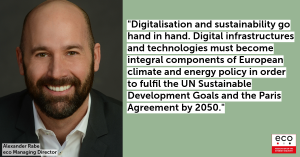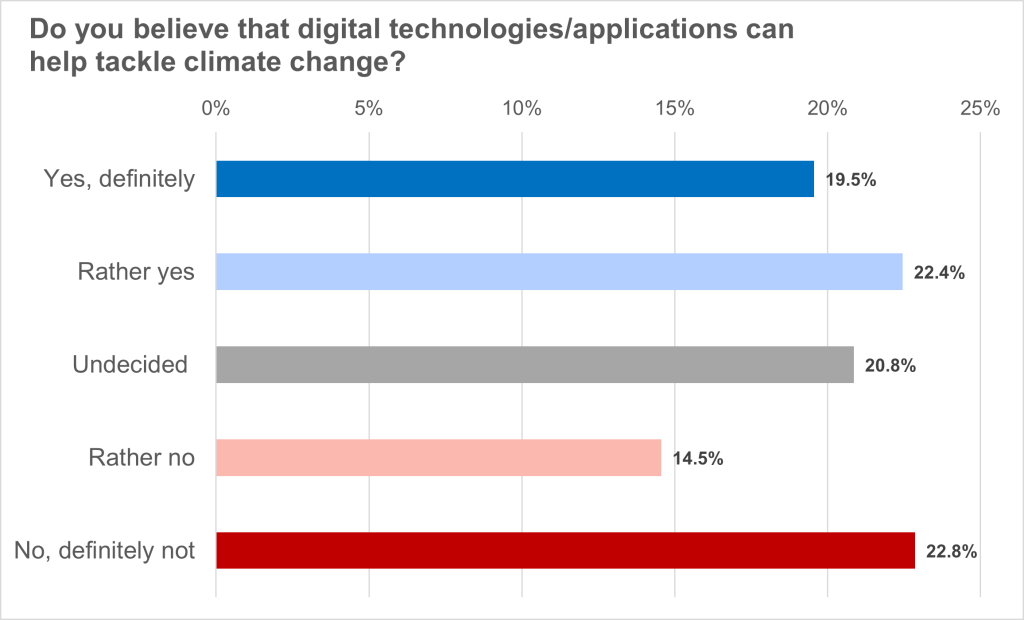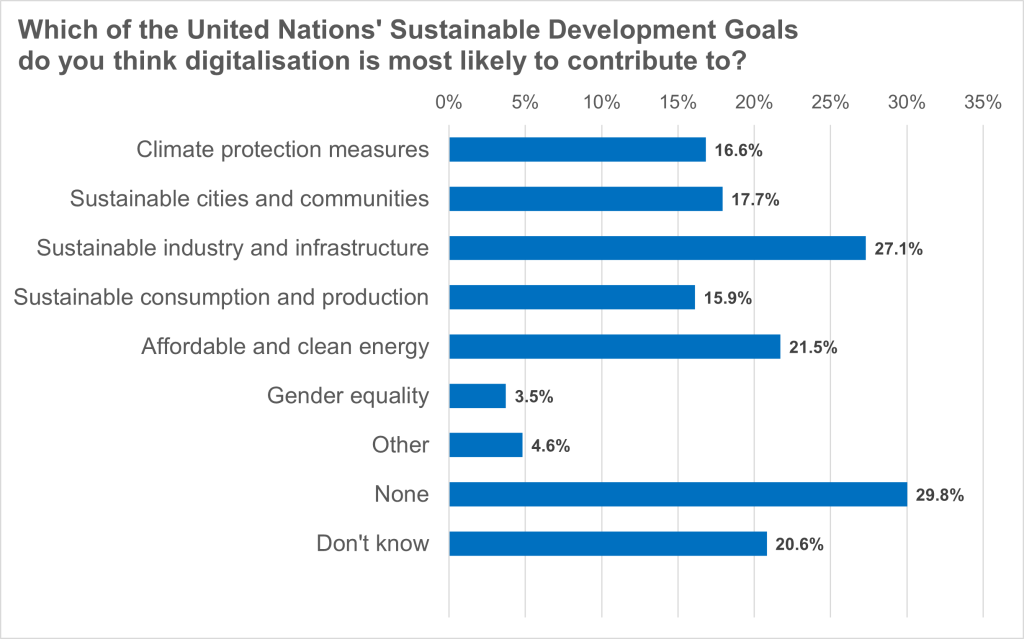As eco’s Managing Director Alexander Rabe states: “Digitalisation and sustainability go hand in hand. Digital infrastructures and technologies must become integral components of European climate and energy policy in order to fulfil the UN Sustainable Development Goals and the Paris Agreement by 2050.”
- Germans recognise the sustainability potential of digitalisation, particularly in the fields of industry and infrastructure (27.1%) and affordable and clean energy (21.5%)
- The eco study reveals that digitalisation measures could, by 2050, enable 163 megatonnes of CO2 savings in industry, urban and rural areas
From 30 November to 12 December this year, the 198 parties of the Framework Convention on Climate Change will meet at the 28th UN Climate Change Conference in Dubai to decide on joint measures aimed at combating the consequences of ongoing climate change. Digitalisation is seen as an important lever for greater energy efficiency and sustainability. This is also the opinion of many citizens in Germany, as shown by recent surveys conducted by the market and opinion research institute Civey on behalf of eco – Association of the Internet Industry.
According to the surveys, around 42 per cent of Germans believe that digital technologies can help in tackling the climate crisis.* When it comes to implementing the 17 UN Sustainable Development Goals, respondents believe that digitalisation has the greatest potential in the fields of sustainable industries and infrastructure (27.1 per cent) and affordable and clean energy (21.5 per cent). The surveys also indicate that digital technologies can contribute to goals such as creating more sustainable cities and communities (17.7 per cent) and implementing climate protection measures (16.6 per cent).**
“Digitalisation holds enormous potential for climate protection and can contribute to resource savings in almost all spheres of life and the economy,” emphasises eco’s Managing Director Alexander Rabe. “In the Paris Agreement, the international community has correctly set itself ambitious goals in the fight against climate change, with all available means being used to achieve them – and digitalisation is part of the solution,” says Rabe.
Accelerating digital transformation for present and future generations
In the surveys, the youngest age group stands out prominently: over half (53.3 per cent) of 18-29 year olds state that digital technologies and applications can help to tackle climate change. In other words, the generation that will be most affected by climate change believes that digitalisation will play a significant role in shaping their future.
“The Sustainable Development Goals were adopted to have a liveable planet for future generations. To ensure that these goals can be met, high-performance digital infrastructures must be expanded, and digitalisation projects must be implemented now,” says eco’s Managing Director. In Rabe’s view, this includes the expansion of connected mobility and the establishment of Europe as a strong technology centre for innovations such as AI. Such developments require planning and support from politicians. “Regulatory requirements and conditions for providers of digital infrastructures and services must be designed in such a way that ‘Made in Europe’ innovations are still feasible in the future. This is how we achieve sustainable digitalisation from and for Europe. We cannot afford to lag behind in digital transformation – too much is at stake for us and future generations,” emphasises Rabe.
eco sustainability study shows 30 per cent CO2 savings by 2050 through digitalisation
A recent eco study in cooperation with Arthur D. Little and the eco-founded Alliance for the Strengthening of Digital Infrastructures in Germany shows just how tremendous the savings potential of digital technologies, applications and infrastructures actually can be. The study “Digital Transformation for More Sustainability” examines the effects of digitalisation in the industrial, urban and rural sectors and anticipates that, by 2050, emissions savings of 163 megatonnes of CO2 will be achieved through the consistent use of digital levers. In addition, CO2 emissions in the areas of data storage and transmission can be reduced by 104 megatonnes, meaning that up to 30 per cent of the CO2 emissions forecast for Germany in 2050 can be avoided through digitalisation.
The eco Association is also committed to the promotion and visibility of sustainable technologies. The #JOINTHESOLUTION initiative showcases digital flagship projects that illustrate positive impact potential in terms of carbon footprint, resource efficiency and sustainability goals.
* On behalf of eco, the opinion research company Civey surveyed 2,508 adult German citizens between 25.10.2023-26.10.2023. The statistical error of the overall results is 3.3 per cent.
** On behalf of eco, the market and opinion research institute Civey surveyed 2,519 adult German citizens between 28.09.2023-29.09.2023. The statistical error of the overall results is 3.0 per cent.
Downloads:






